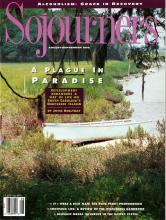Christian crossover artists--be they pop, heavy metal, or gospel--are currently experiencing an upsurge in popularity. Some are doing quite well financially, thank you very much. Although those who weave an alternative cultural message into their music are somewhat less known, their contributions enliven and deepen our lives, as well as our worship, nonetheless. So let's get to know them a bit.
The Rock of Our Salvation
Tom Prasada-Rao offers a heartening mix of astute political critique and subtle biblical imagery on his debut recording, Incoming (Crossroads Records, 3905 National Dr., Suite 300, Burtonsville, MD 20866; 1991). Ethiopian-born to Indian parents, Prasada-Rao combines upbeat rhythms with tight melodies and insightful lyrics to create songs that are both penetrating and encouraging.
Prasada-Rao opens the recording with "Talking Blues," a colorful anthem to the trappings of capitalism without democracy. He sings:
talk about the war on poverty
Uncle Sam's got a dollar for you and me
living in the land of liberty
we got an eye on the man in need
we're handing out enough just to watch him bleed
hail to the flag, red white and greed...
if God's in heaven can he hear you now
It's an early indication of the commentary that will follow.
"The Needle's Eye" continues this critique with another catchy tune. After laying out the temptations and entanglements of gold and glitter in our society, Prasada-Rao offers in the chorus: "Cast your bread upon the sea/make a new man out of me, out of me/take my hand and lift it high/pull me through the needle's eye/Adonai."
Read the Full Article

